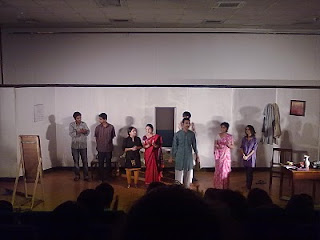Little is known about Chanakya, the author of Arthashastra, who is supposed to have lived some 2300 years ago, believed to be the chief architect of Chandragupta Maurya's rise to power. The unknowns are vast that it leaves plenty of opportunity for historical fiction writers to fill in those gaps with their creative imagination. In Chankya's Chant, Ashwin Sanghi went one more step ahead.
While going through the mind of Chanakya to understand his strategic mind, a number of question arises. What was the political situation like during Chanakya's period? What made him to architect Chandragupta Maurya rise to power? Who were the enemies with whom he fought in order to achieve his goal? If he ever succeeded in his mission, why were his works not popular in today's world? Finally, what was his love life like? Did he fall in love? If so, how did he balanced his love life with politics?
The questions posed above to the reader is not complete, however, it gives you an idea of a good start for a story. In addition to these questions, Ashwin added: "What if Chanakya were to be cursed by his lover due to his greater love for the nation instead of her? If Chanakya were to be cursed, what is the cure for his fault?
Chanakya's Chant is as follows:
Adi Shakti, Namo Namah; Sarab Shakti, Namo Namah; Prithum Shakti, Namo Namah; Kundalini Mata Shakti; Mata Shakti, Namo Namah.
which means
Primal Shakti, I bow to thee; all-encompassing Shakti, I bow to thee; that through which God creates, I bow to thee; creative power of the Kundalini; mother of all, to thee I bow.
Chanakya indeed had a girl friend, named Suvasini. He was cursed by her since he paid more attention to the nation to the extent that he used Suvasini as a whore to achieve his goal. However, Suvasini felt sympathetic with Chanakya for his nobel cause, and hence suggested the following cure
Four thousand days you shall pray
Four hundred chants every day.
Chanakya's power is yours to take
Chandragupta, to make or break.
If there's a lull, start once more.
King must be queen, to be sure.
Suvasini's curse shall forever halt
If you can cure Chanakya's fault.
The chant forms the central theme of the story, the mantra japa gives the contemporary kingmaker Pandit Gangasagar Mishra the Chanakya's power for rising Chandini Gupta to queen (prime minister of Independent democratic India).
While Suvasini herself was chanting for Chanakya in order that he succeeds in his mission to Lord Shiva
Om tryambhakam yajamahe, sugandhim pushtivardhanam; urvarukamiva bandhanam, mrityor mukshiya maamrital.
which means
O praise to the Three-Eyed One, who increased prosperity, who has a sweet fragrance, who frees the world from all diseases and death! Liberate-as the fruit from the wine. Shiva, grant immortality!
Chanakya's Chant is an interesting read for all those who love to read historical fiction. Through his writing, Ashwin takes us back and forth to the Chanakya's time and present day with his vivid imagination.







